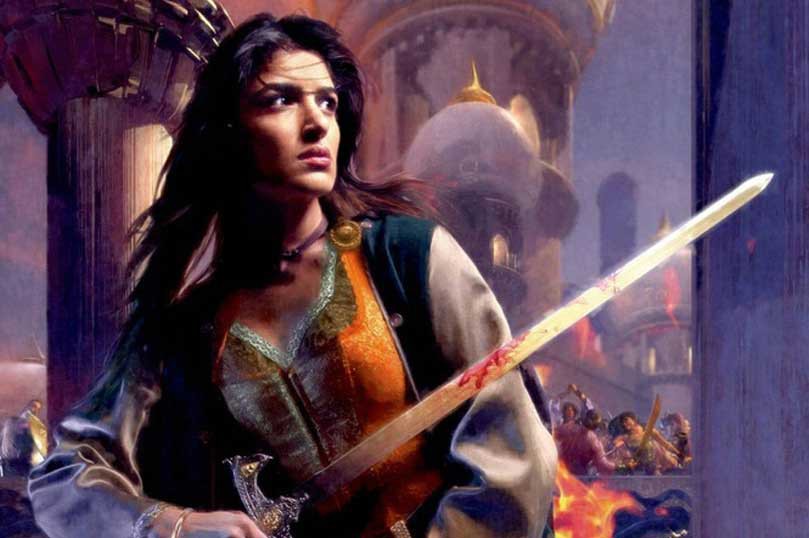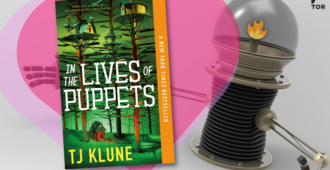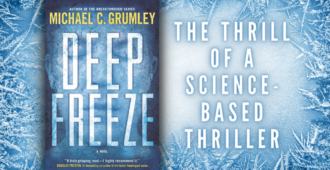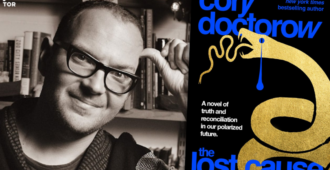Written by Beth Bernobich
There’s been a lot of talk recently about the presence and roles of women in epic fantasy stories. Tansy Roberts wrote a sharp-edged take-down of the notion that women never did anything important in history in her article Historically Authentic Sexism in Fantasy: Let’s Unpack That. Kameron Hurley followed up a couple months later with ‘We Have Always Fought’: Challenging the ‘Women, Cattle and Slaves’ Narrative.
Read both articles and follow the links for the whole discussion, but the short form is: women have played all kinds of roles and followed all kinds of careers throughout history, and to leave them out of epic fantasy is not historically accurate. You can choose to leave out women, but don’t use history as your excuse.
Much of this debate took place while I was writing Allegiance, the third book in my River of Souls trilogy. The books are epic fantasy, set in a world where souls are reborn from life to life. They’re about a young woman, Ilse Zhalina, and her journey toward independence and agency. And because these novels are epic fantasy, they have lots of characters, and a lot of them are women.
Ilse has changed a great deal since her story began in Passion Play. She’s older, stronger, and more capable. But she’s not the only woman in the book, and certainly not the only strong woman. I wanted to portray a world where the women lived lives as varied as the men did, and where those women are in the foreground of the story. Where they are villains or heroes, queens or merchants, poets or cooks. Sisters, soldiers, healers, or spies.
SISTER
Ilse’s beloved, Raul Kosenmark, has three sisters: “Three barbed and dangerous creatures,” as Raul describes them. Ilse meets all three of them for the first time in Allegiance:
“At last, our foolish brother chose someone with sense. And,” she added, “a very nice sword. My name is Heloïse.”
The rest gave their names rapidly. Marte, tall and slim and with eyebrows arcing over a strong face drawn in uncompromising angles. Olivia, a smaller, rounder version of the same. Terrible creatures, all of them, Ilse thought, with their laughter and smiles edged with sharp wit. She no longer wondered why Raul had absented himself from his home in Valentain. He and they were much alike, shielding their hearts beneath masks. It would be too painful, living with reflections of himself.
And yet, they are more than reflections of their brother. They act together, taking charge when they need to (and sometimes when they don’t). They have their own histories, their own strengths and flaws, their own loves, and their own futures.
HEALER
Not everyone in the story is a noble. Maryshka Rudny lives in the remote village of Ryz, in the far southwest of Károví. She and her mother, Ana, are healers for the village, which gives them a significant measure of authority. When Ilse arrives with a badly wounded companion, Maryshka takes control of the situation:
The young woman thrust back her hair and laid a hand on Bela’s forehead. Her mouth thinned. She touched two fingers to Bela’s throat and her lips moved rapidly. Not an invocation to the gods and magic, Ilse thought, not here in Duszranjo.
Maryshka glanced over her shoulder at the still-arguing men. “Jannik, she’s dying. Louka, if you insist, I can make the pledge myself to Lir, Toc, and your blessed honor, that she won’t hurt anyone or anything.”
“What about the other one?” Louka said.
The young woman’s gaze swung around to meet Ilse’s. “What do you say? Shall I pledge myself for you as well? Speak quickly.”
Maryshka appears only for a short segment of Allegiance, but it’s her skills that save Bela’s life and enable Ilse to continue her journey.
SOLDIER
The injured companion mentioned above is Bela Sovic, a captain in Duke Miro Karasek’s personal guard, skilled in magic as well as warfare. Shortly after they meet, she tells Ilse how she came to serve the Duke:
“It was his father who bought me from the prison. I had tried to fight the pirates on my own after they killed my sister and brother. I—I was less able to distinguish between the enemy and someone merely ignorant, or greedy, and I killed the wrong person. Several wrong persons. The king wished to punish me. I cannot say I disagree, but the old duke believed in mercy. He paid the blood price and took me from the prison. For what he—and his son—have done for me, I would do anything in return.”
And she does—facing exile, injury, and death with courage.
SPY
When Ilse first meets Nadine in Passion Play, Nadine is one of the courtesans in Lord Kosenmark’s pleasure house. Nadine has a complicated past, which she only hints at to Ilse. She also has a deeply ingrained sense of self-preservation because of that past:
Nadine had not shared any of the secrets she had uncovered for herself over the past six years. A little judicious spying. The practice of carelessly glancing over the envelopes the senior runner carried to Kosenmark or his secretary of the moment. All habits learned in previous houses, previous lives. And most effective, when she had discovered certain key listening devices scattered around the pleasure house. Nadine knew about Kosenmark’s political games. He might claim a higher cause for his actions, but in truth, they both wished to survive in a chance-riddled world.
In Allegiance, Nadine turns from courtesan to spy, using her skills in the much wider—and much more dangerous—world of the royal palace. In the end, it’s because of Nadine and her spying that events turn out as they do.
Six women, from different kingdoms and different classes, each of them strong in different ways.
…………………………
From the Tor/Forge October 21st newsletter. Sign up to receive our newsletter via email.
…………………………
More from the October 21st Tor/Forge newsletter:
- On a Bus to New York by Fred Chao
- An Editor’s Dirty Little Secret by Claire Eddy
- October Grab Bag Sweepstakes








Wow–I have long believed that the strength of women has been largely ignored. For instance, in researching my personal genealogy, one of my ancestors who fought in the American Revolution left behind on the farm, a pregnant wife with 4 preschool aged children, and it was up to her to get the crop harvested and keep hunger from the door while he was away–not a role for a weakling! That story replayed in the War Between the States when young wives held things together, and with my grandmother in the Great Depression, supporting a disabled husband and 2 small daughters. Now that women are part of our nation’s fighting forces, their abilities to rise to any challenge are less often challenged, but it’s nothing new to see women as involved as men in life and death struggles, both real and fictional.
NOTE: Advanced apologies, this is going to sound like i’m being churlish, but please bare with me, as i’m going somewhere with this.
“There’s been a lot of talk recently about the presence and roles of women in epic fantasy stories.”
No there really hasn’t. Theres been a lot of talk about how there SHOULD BE a lot of talk on the topic. However its mostly just used by writers writing articles about different forms of fiction in media, who want to put the cat among the pigeons a little: its an utterly safe, well tread path to publicity.
“women have played all kinds of roles and followed all kinds of careers throughout history”
As they have through-out the history of speculative fiction in essentially all of its infinite variation, since almost as long as there was speculative fiction for people to read. From the rare occurences in the pulps, to the common place nature of it the science fiction radio plays of the 40 & 50’s to the science fiction published for the first time in playboy.
So can we pretty pretty please drop this topic for a while… Because frankly i’m starting to hate female characters… Not based on anything those characters have done or not done, but based entirely on articles that essentially start with some variation of “Hi gentle readers, i’m thought we could spend another page waxing lyrical about the female character based on gender, rather than quality of writing.”
As a topic its trite & frankly its been talked into the ground already & continuing to do so is just poisoning the well as everyone gets increasingly sick of the topic. So here’s an idea for a TOR article, “Female Villains, doing it well & doing it wrong: An analysis of antagonism.”
You could even touch on why they are so rare with both male or female authors… Now thats an article i’d read: Its neither played out, nor cookie cutter safe.
However Beth, if you want to tell us about your new book & promote it, then please do: As a librarian & a speculative fiction fan I personally would love to hear about a new intellectual property, but don’t try to bury the product under the “lets talk about women characters” false leed. Just tell us about your book, sell it on its own merits.
An again, i’m sorry for sounding churlish, but i have come to dislike both the bait & switch & the topic used for the bait and switch.
I totally agree. It is liked we just popped out of the ground! O my! There is a female character!
Here’s a tip: if reading articles about women characters in Fantasy bores you, stop reading them. That way, you can cease being bored and the rest of us can still have the articles to read. It’s win-win.
I discuss this fairly often on my blog because my protagonist is a girl and I’m writing YA so I have to be aware of how I portray morality and gender roles.
Taya looks weak at first- only because she’s a healer and not much of a fighter, but she quickly learns and grows more powerful.
Violet Skies will be published by Thanksgiving.
edwardlcote.blogspot.com
Most of Heinlein’s stories about the family of the Man from Mars have women as the keystone of their family. Just sayin. Women are known to be strong, it’s not a new development.
Morningstar, I’ll stop talking about the absence of strong central female characters when it stops being a problem. Deal?
Tyson, To be honest, I can’t read Heinlein. In the few that I tried, his strong women were all gorgeous and always ready for sex with the stronger, smarter men, who held more prominent roles. And they all ended up just wanting to have babies. That’s not my idea of a strong woman.
And sadly, if women were generally known to be strong, why the lack of them in epic fantasy? Why are women so often cast as “wife of”, “girlfriend of”, “third rape victim on the left” and nothing more? Read the comments in the articles I linked to, and you’ll find comment after comment insisting that it’s not historically accurate for women to play leading roles in history, and so of course the men should be the main characters–even though the articles themselves point out example after example of women taking charge, fighting wars, captaining pirate fleets.
We’ve made a start with all those kickass warrior heroines in urban fantasy, but I’m greedy. I want more women as main characters, and as secondary characters, with all kinds of strengths. They exist, but they are all too rare.
@Morningstar:
“Why are women so often cast as “wife of”, “girlfriend of”, “third rape victim on the left” and nothing more?”
Maybe for the same reason your protag was a rape victim in Passion Play? Interesting cover for that book, by the way.
I would posit there is a difference between a nameless rape victim, whose presence is merely part of the grim-dark setting, and a female main character whose story includes recovery from sexual assault.